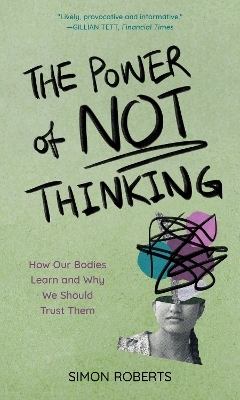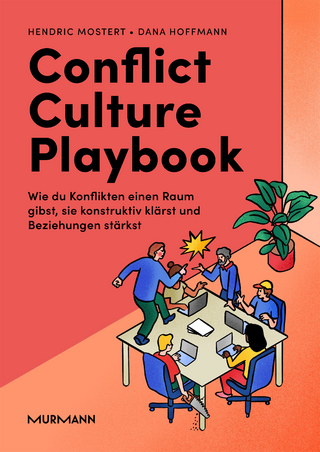
The Power of Not Thinking
How Our Bodies Learn and Why We Should Trust Them
Seiten
2022
Rowman & Littlefield (Verlag)
978-1-5381-6775-5 (ISBN)
Rowman & Littlefield (Verlag)
978-1-5381-6775-5 (ISBN)
Drawing upon an incredible range of cutting-edge science, real-life examples, and personal experience, Simon Roberts explores the complexity of even the simplest of tasks that humans perform every day and explains how, with a greater awareness of the processes at work, we can tap into our full potential and excel in any area of our lives.
Details the role our body plays in how we learn and how we can tap into our body’s knowledge to excel in all facets of life.
Ask someone to point to the part of their body responsible for their intelligence and it is highly likely that they will point at their head. This assumption is understandable, given that, for centuries, from Descartes’ “cogito ergo sum” to the computer age, this is what we have been told to think.
And yet we all share common experiences that have revealed the incomparable power of “not thinking”. Have you ever struggled to remember your pin number only to hold your fingers out and type it correctly with your hands, played the piano without focusing on remembering the correct notes or listened to your gut feeling when under the pressure of a big decision? All these instances prove that it is time to stop neglecting the role the body plays in our acquisition of knowledge and to explore how it is that brain and body combine to deliver what we view as uniquely human intelligence. You never forgot how to ride a bike did you?
In this unique new book, social and business anthropologist Simon Roberts looks at the pivotal role that our body plays in how we learn and reminds us of why we should learn to listen to it more often. Drawing upon an incredible range of cutting-edge science, real-life examples and personal experience, Roberts explores the complexity of even the simplest of tasks that humans perform every day and goes on to explain how, with a greater awareness of the processes at work, we can tap into our full potential and excel in any area of our lives.
His proposition isn’t the antidote to big data, cold rationalism, and reductionism. But, as embodied knowledge emerges from our engagement and interaction with the world, the author underlines why intelligence does not solely reside in our brains. If there’s a single, practical message to be taken from it, it is that we should give more credit to the role of the body as a resource for learning about and understanding the world. That means a more ‘sleeves rolled up’, engaged and practical way of ‘learning by doing’ not by rational detachment.
Details the role our body plays in how we learn and how we can tap into our body’s knowledge to excel in all facets of life.
Ask someone to point to the part of their body responsible for their intelligence and it is highly likely that they will point at their head. This assumption is understandable, given that, for centuries, from Descartes’ “cogito ergo sum” to the computer age, this is what we have been told to think.
And yet we all share common experiences that have revealed the incomparable power of “not thinking”. Have you ever struggled to remember your pin number only to hold your fingers out and type it correctly with your hands, played the piano without focusing on remembering the correct notes or listened to your gut feeling when under the pressure of a big decision? All these instances prove that it is time to stop neglecting the role the body plays in our acquisition of knowledge and to explore how it is that brain and body combine to deliver what we view as uniquely human intelligence. You never forgot how to ride a bike did you?
In this unique new book, social and business anthropologist Simon Roberts looks at the pivotal role that our body plays in how we learn and reminds us of why we should learn to listen to it more often. Drawing upon an incredible range of cutting-edge science, real-life examples and personal experience, Roberts explores the complexity of even the simplest of tasks that humans perform every day and goes on to explain how, with a greater awareness of the processes at work, we can tap into our full potential and excel in any area of our lives.
His proposition isn’t the antidote to big data, cold rationalism, and reductionism. But, as embodied knowledge emerges from our engagement and interaction with the world, the author underlines why intelligence does not solely reside in our brains. If there’s a single, practical message to be taken from it, it is that we should give more credit to the role of the body as a resource for learning about and understanding the world. That means a more ‘sleeves rolled up’, engaged and practical way of ‘learning by doing’ not by rational detachment.
Simon Roberts’ twenty-year career as a business anthropologist has included founding the UK’s first dedicated ethnographic research company, running an innovation lab at Intel and being ethnographer-in-residence at technology think tank, iSociety. His consulting experience centres on product, business and platform strategy, in consumer and business contexts. Simon’s work has been covered by Bloomberg, The Financial Times, Wall Street Journal, BBC Radio 4 and Quartz. This is his first book. He lives with his wife and three children in East Sussex.
| Erscheinungsdatum | 17.08.2022 |
|---|---|
| Verlagsort | Lanham, MD |
| Sprache | englisch |
| Maße | 158 x 236 mm |
| Gewicht | 621 g |
| Themenwelt | Sachbuch/Ratgeber ► Beruf / Finanzen / Recht / Wirtschaft ► Bewerbung / Karriere |
| Geisteswissenschaften ► Psychologie ► Allgemeine Psychologie | |
| Geisteswissenschaften ► Psychologie ► Biopsychologie / Neurowissenschaften | |
| Geisteswissenschaften ► Psychologie ► Verhaltenstherapie | |
| ISBN-10 | 1-5381-6775-1 / 1538167751 |
| ISBN-13 | 978-1-5381-6775-5 / 9781538167755 |
| Zustand | Neuware |
| Informationen gemäß Produktsicherheitsverordnung (GPSR) | |
| Haben Sie eine Frage zum Produkt? |
Mehr entdecken
aus dem Bereich
aus dem Bereich
so wandeln Sie vermeintliche Schwächen in Stärken um
Buch | Softcover (2024)
Springer (Verlag)
24,99 €
so werden Sie ein guter Vorgesetzter
Buch | Softcover (2023)
Humboldt (Verlag)
12,00 €
wie Du Konflikten einen Raum gibst, sie konstruktiv klärst und …
Buch | Hardcover (2024)
Murmann Publishers (Verlag)
39,00 €


